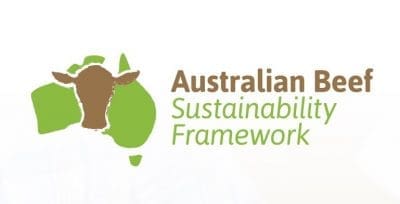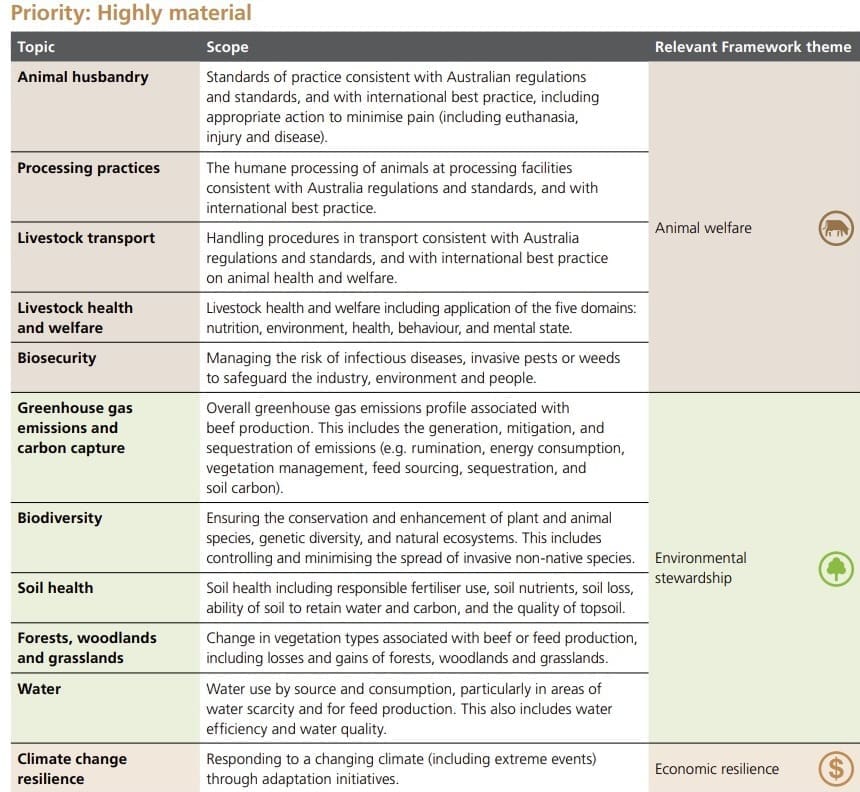THE Australian Beef Sustainability Framework has released its latest Materiality Review, outlining and ranking what it has identified as the top environmental and sustainability priorities for the beef industry.
The key objectives of the 2020 materiality review* were to undertake a review and confirm the range of topics that are material to the Australian beef industry and reflected in the ABSF, maintain a consistent application of evolving sustainability-related standards in the ongoing development of the ABSF, and engage with a range of stakeholders and seek their feedback on both the material topics and the ABSF’s progress.
 The review was based on an initial materiality assessment back in 2016 that identified and prioritised the sustainability topics that matter most.
The review was based on an initial materiality assessment back in 2016 that identified and prioritised the sustainability topics that matter most.
The Sustainability Steering Group undertook a project to review and update the current list of topics and scopes through a 2020 materiality review.
The latest review identifies and prioritises the industry’s material topics – topics that reflect the industry’s significant economic, environmental, and social impacts or that substantively influence the assessments and decisions of stakeholders. Impacts can be positive or negative.
The key objectives of the materiality assessment were to:
- Undertake a review and confirm the range of topics that are material to the Australian beef industry and reflected in the ABSF
- Maintain a consistent application of evolving sustainability-related standards in the ongoing development of the ABSF
- Engage with a range of stakeholders and seek their feedback on both the material topics and the ABSF’s progress.
The review included an initial desktop review of material topics for the Australian beef industry; refining topics through a first round of consultation involving interviews with industry and external stakeholders and experts; a second round of consultation involving an online survey, online producer forums and further stakeholder interviews; prioritisation of material topics based on input from the online survey and expert input; and a final validation by the SSG of the prioritised list of material topics and scopes.
As part of the consultation, 55 stakeholders were interviewed, 57 stakeholders were directly engaged through a forum and more than 200 stakeholders provided responses through the online survey. Responsiveness from stakeholders indicated a high level of interest.
Following the two rounds of consultation, each material topic was prioritised, based on the industry’s economic, environmental, and social impact, and the topic’s influence on stakeholders’ decisions in relation to the industry.
Topics were ranked as highly material, material, or important.
Listed among high priority areas were:
- Animal husbandry
- Livestock health and welfare
- Processing practices
- Livestock transport
- Greenhouse gas emissions and carbon capture
- Biodiversity
- Soil health
- Forests, woodlands, and grasslands
- Climate change resilience
- Biosecurity
- Water
Recommendations
The review recommended that a review take place of the current themes, priorities, indicators, and progress of the ABSF, in light of the results of the assessment, to identify gaps, strengths, and weaknesses.
It also encouraged researching emerging topics such as land tenure, Indigenous peoples’ access, human rights, and labour practices.
The review recommended investigating contested and interrelated topics such as biodiversity, ground cover, land use, and land conversion, and expanding stakeholder engagement activities to directly include underrepresented groups such as Indigenous Australians and organisations involved in livestock transport.
* A materiality review is the process of identifying and prioritising a company or industry’s significant environmental, economic, or social impacts. These impacts can be positive or negative. The identified list of significant or material issues is based on scientific literature, industry and social norms, the policy and regulatory architecture, and the views of stakeholders. The identified material issues guide company or industry action to monitor, address and report on its sustainability impacts. Materiality is a core principle of sustainability reporting standards such as the GRI Standards (2016).

